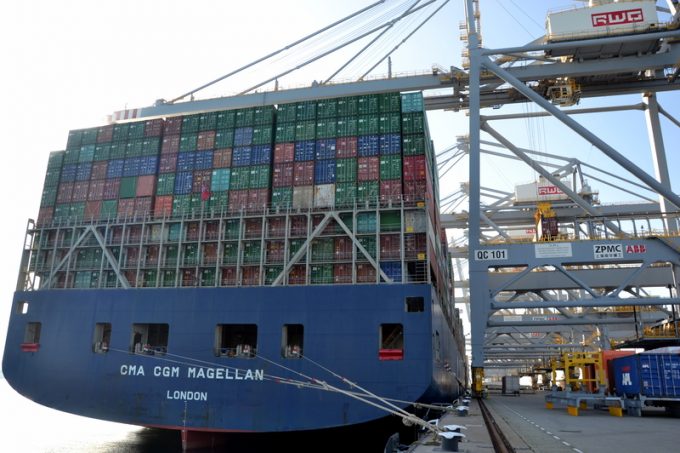Container spot rates have peaked as all major trades see prices fall
There was more evidence in this week’s container port freight markets that peak prices on ...
TFII: SOLID AS USUALMAERSK: WEAKENINGF: FALLING OFF A CLIFFAAPL: 'BOTTLENECK IN MAINLAND CHINA'AAPL: CHINA TRENDSDHL: GROWTH CAPEXR: ANOTHER SOLID DELIVERYMFT: HERE COMES THE FALLDSV: LOOK AT SCHENKER PERFORMANCEUPS: A WAVE OF DOWNGRADES DSV: BARGAIN BINKNX: EARNINGS OUTODFL: RISING AND FALLING AND THEN RISING
TFII: SOLID AS USUALMAERSK: WEAKENINGF: FALLING OFF A CLIFFAAPL: 'BOTTLENECK IN MAINLAND CHINA'AAPL: CHINA TRENDSDHL: GROWTH CAPEXR: ANOTHER SOLID DELIVERYMFT: HERE COMES THE FALLDSV: LOOK AT SCHENKER PERFORMANCEUPS: A WAVE OF DOWNGRADES DSV: BARGAIN BINKNX: EARNINGS OUTODFL: RISING AND FALLING AND THEN RISING

CMA CGM has secured a €1.05bn loan from BNP Paribas, HSBC and Société Générale, backed by the French government.
The new debt comes under France’s state-guaranteed loan scheme, established at the end of March in response to the Covid-19 pandemic.
The state has guaranteed 70% of the loan, which has an initial one-year maturity and an extension option for up to five years.
The company said the new funding was obtained to “further strengthen CMA CGM’s cash position in order to confront uncertainties in the global economy resulting from the health crisis and lockdown measures in a large number of countries”.
“I would like to thank the French authorities for having introduced this scheme so effectively and quickly,” said Rodolphe Saadé, CMA CGM chairman and chief executive. “It shows the confidence our banking partners have in the CMA CGM group’s business model and strategy.
He said the company had transported several hundred million masks and medical supplies, “essential in responding to the health emergency”.
Despite the sudden demand for PPE and essential household items in the initial phase of the pandemic, container shipping lines have subsequently been faced with a precipitous decline in demand, and CMA CGM was forecasting a “decrease in market volumes of 10% in the first half of 2020, compared with the first half of 2019”.
Last week the EC’s competition commission further relaxed its state aid regulations, as European companies in a range of sectors continue to face a liquidity crisis in the face of the sudden drop in demand. However, EC competition commissioner Margrethe Vestager explained that the new state aid laws came with some caveats.
“Our rules now also enable such support through subordinated debt,” she said. “As the crisis evolves, many businesses will also need capital to stay afloat. If member states decide to step in, we will apply today’s rules to ensure that taxpayers are sufficiently remunerated and their support comes with strings attached, including a ban on dividends, bonus payments as well as further measures to limit distortions of competition.
“And for public transparency, large companies also have to report on the use of aid received and compliance with their responsibilities linked to the green and digital transitions.”
Comment on this article